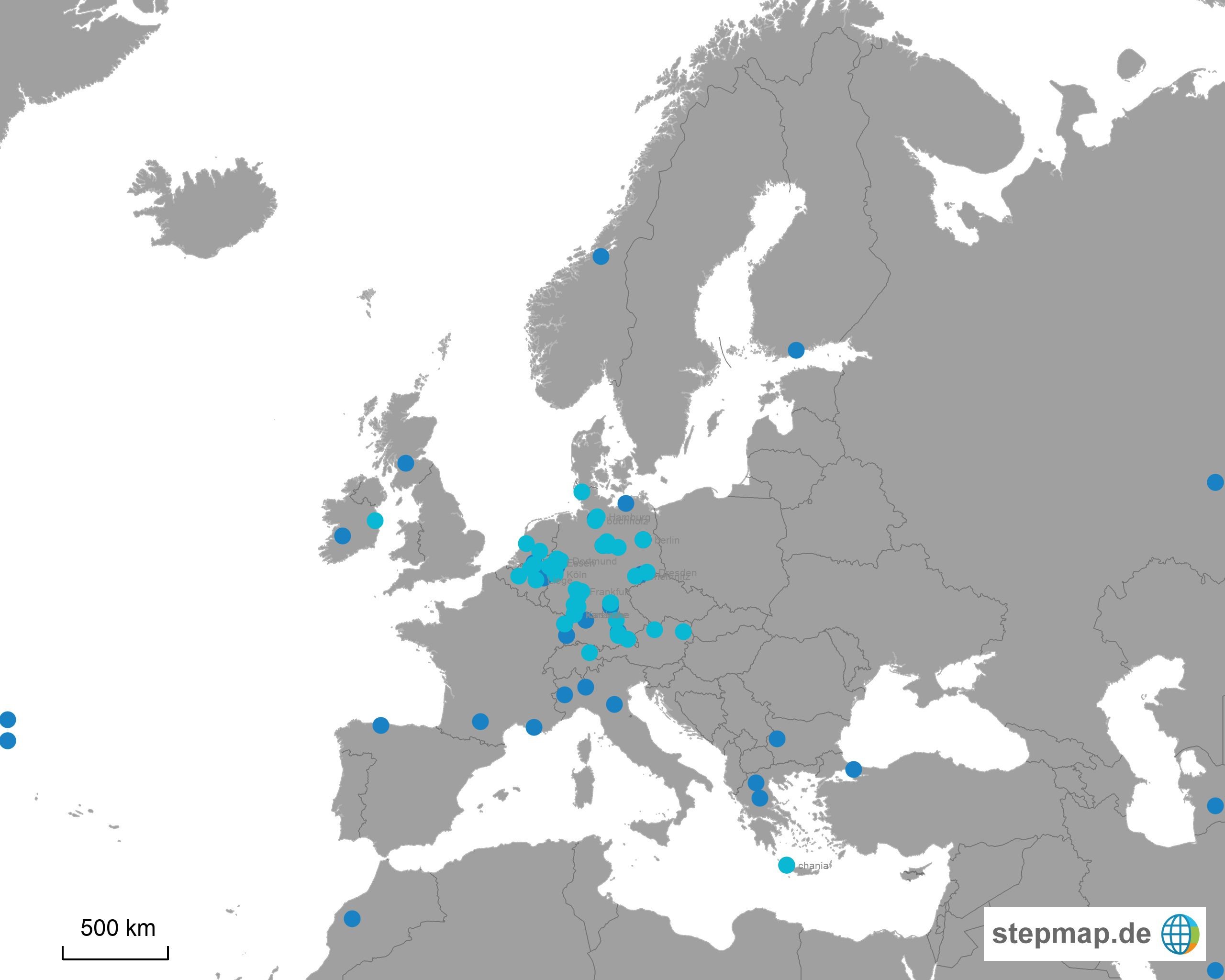EU Projects
The Institute has been involved in research projects funded by the European Commission through the 6th and 7th framework programs as well as the Horizon 2020 program. Currently, two projects are carried out within Horizon 2020.
Fig. 1: Cooperation partners of IMVT in Europe. Blue color denotes academic partners, turquoise stands for industry
Ongoing projects
| title | short description | contact |
|---|---|---|
| Demonstration vollständiger Wertschöpfungsketten für die Herstellung fortgeschrittener Biokraftstoffe und nicht-biologischer erneuerbarer Kraftstoffe (Poseidon) | The overall objective of the POSEIDON project is to prepare the implementation of local value chains based on emethanol as fuel for shipping in the ports of Valencia and Thessaloniki. This will be achieved by connecting local stakeholders and collecting requirements through local Communities of Practice (COP), investigating CO2 valorisation routes, developing and demonstrating innovative solutions including a power-to-e-methanol pilot plant and 2- and 4-stroke engines, evaluating the technical, economic, environmental and social impacts at case study level, drafting roadmaps describing post project activities and making tools and knowledge accessible in an open science manner to remove barriers to implementation and foster the replication and upscaling of e-methanol ecosystems in EU. |
|
| Grüner Solar-zu-Treibstoff-Wasser-Antrieb (Green Swap) | Green SWaP will prove and validate a technology that will use solar energy to produce propellants (H2O2/H2) from water for in-space green propulsion. It will be a crucial building block to enable innovative green propulsion solutions for in-space mobility, resulting in low-cost and eco-friendly innovative concepts. It is a novel approach, never developed for in-space mobility (thus beyond SoA). Studies exist for on-earth chemical applications, but many of the constraints are specific to terrestrial applications and do not apply to in-space systems (thus ambitious). The new technologies, based on innovative chemical processes, will harvest solar power to enable green propulsion. It is a plausible methodology because underlying technological concepts of producing/concentrating/storing H2O2/H2 using solar energy have been proven (separately) even though for different constraints and conditions of use than in-space applications. H2O2/H2 as propellants for in-space applications is known but must has never been investigated in detail and the utilization of H2 for solar thermal propulsion is theoretically proven to be the most promising but it has never been developed as technology. The combination of these technologies will drastically increase future spacecrafts’ capabilities, facilitating renewable and self-sustainable in-space mobility. Optimisation concerning the quality and quantity of H2O2/H2 produced onboard and an efficiency improvement will be fully explored. |
|
| Forschungsinfrastrukturdienste für erneuerbare Energien (RISEnergy) | The European Green Deal aims to transform the EU into a modern, resource-efficient and competitive economy with zero net greenhouse gas emissions by 2050. To achieve more efficient, competitive and cost-effective energy systems and devices, RISEnergy fosters a European ecosystem of industry, research organizations and funding agencies aimed at developing novel energy technologies and concepts. RISEnergy brings together a consortium of 69 beneficiaries from 23 countries: ERIC institutions, technology institutes, universities and industrial partners, to jointly improve the economic performance of technologies. Members of the European Energy Research Alliance are establishing the core European ecosystem. The main objectives of RISEnergy are: 1.) enable research and innovation to increase energy efficiency and reduce the cost of energy technologies to foster wider use of renewables into energy systems through proactive innovation management having single entry point with tailor-made access roads for academics, industry, and SMEs, and advising RI providers, all acces Users, and policy makers on LCA, ICT development and networking issues; 2.) provide efficient transnational access (TNA) to facilities to support renewable energy technologies and systems: Provide more than 2,500 days of access to major European and international world-leading analytical facilities; 3.) reach out to all stakeholders performing research along the value chain, from materials and technology development to applications in the eight most relevant fields of PV, CSP/STE , hydrogen, biofuels, offshore wind, ocean energy, integrated grids, and energy storage, research infrastructure providers and policy makers; 4.) provide comprehensive services of unprecedented quality: new cross-RI services, a single entry point, tailor-made access roads for academia industry, and SMEs with a particular focus on scientists from research fields in which the use of research infrastructures is not yet established. |
| title | short description | contact |
|---|---|---|
| BlackSeaEra.Net H2S-Proton | Hydrogen production from H2S decomposition in micro-structured proton-conducting solid oxide membrane reactors |
|
| F3Factory | The aim of the EU project F3Factory was to increase efficiency and flexibility in the development of efficient and sustainable processes in the chemical industry: The factory of the future is more effective, more flexible and, above all, spares resources far better than current standards. |
|
| IceFuel | The rapidly growing worldwide energy needs and the diversification of the energy mix with an increasing share of renewable energies are challenging for existing energy infrastructures. More flexible solutions are required, especially those that integrate renewable energies more efficiently. With icefuel® (integrated cable energy system for fuel and power), a flexible system for energy storage, distribution and decentral reconversion has been developed. |
|
| MINERVE - Management of Intermittent & Nuclear Electricity by High Efficiency Electrochemical Reactor for the Valorisation of CO2 in flexible Energies | MINERVE project dealt with the issue of the CO2 value chain and with the development of a new family of solutions for renewable electricity storage/valorization through “Power to Gas”. |
|
| SynCon - Novel synthesis process concepts for efficient chemicals / fuel production from biomass | The project aimed at the efficient production of fuels and chemicals (CH4, methanol, DME, H2, FT, SNG, second generation bioethanol, fine chemicals) for the application at small scale biomass conversion. IMVT coordinated the overall project. |

